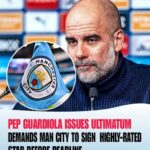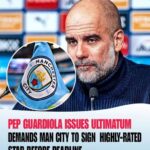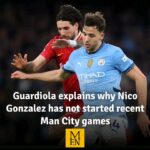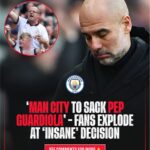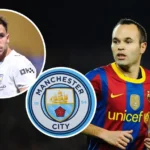Not sure Pep likes him’… Fans think one player’s Man City career could actually be in jeopardy now
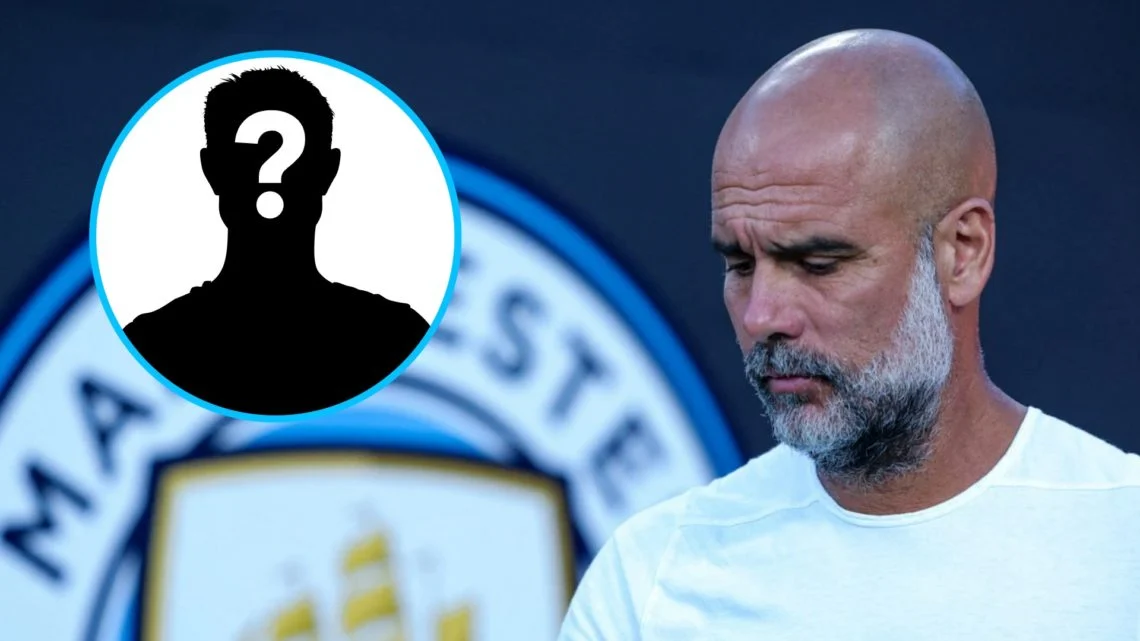
The summer transfer window of 2025 has brought with it the familiar chorus of speculation surrounding Manchester City’s squad composition, but one name that has emerged as a particularly intriguing case study is that of Nico Gonzalez. The Portuguese midfielder, who arrived at the Etihad Stadium with considerable fanfare in January 2025, now finds himself at the center of an uncomfortable narrative that questions whether his £50 million price tag was justified and, more pressingly, whether his future lies with the Premier League champions.
When Manchester City moved to secure Nico Gonzalez’s services from FC Porto in the dying days of the January transfer window, the context was clear and urgent. Rodri’s injury had left a gaping hole in the heart of City’s midfield, exposing a vulnerability that had been meticulously masked by the Spanish international’s consistent excellence over previous seasons. The need for a replacement was not merely tactical but existential for a team that had built its identity around controlling the tempo and rhythm of matches through central midfield dominance.
Gonzalez represented what appeared to be the perfect solution. At 23 years old, he possessed the physical attributes and technical skills that bore striking similarities to Rodri’s profile. His performances in the Portuguese league had caught the attention of several European giants, but it was Pep Guardiola’s specific endorsement that sealed the deal. The Catalan manager’s description of Gonzalez as a “mini Rodri” carried significant weight, suggesting that the young midfielder possessed the rare combination of defensive awareness, passing range, and positional intelligence that made his Spanish counterpart so invaluable.
The transfer fee of £50 million, while substantial, seemed justified given the circumstances. City were in the midst of a crucial period of the season, fighting on multiple fronts, and the absence of Rodri had already begun to expose tactical limitations that opponents were eager to exploit. In this context, Gonzalez’s arrival was not just an investment in quality but a necessity for maintaining competitive standards across all competitions.
Nico Gonzalez’s debut against Newcastle United provided a tantalizing preview of what Manchester City fans hoped they had acquired. In a performance that drew immediate comparisons to Rodri’s own influential displays, Gonzalez demonstrated the kind of composure and tactical intelligence that had made him such an attractive prospect in the first place. His passing was crisp and purposeful, his positioning was exemplary, and his ability to read the game showed the kind of maturity that belied his relative youth.
The performance was significant not just for its technical excellence but for the way it seemed to validate Guardiola’s faith in the player. The Spanish manager’s post-match comments were effusive, praising Gonzalez’s understanding of the game and his ability to adapt quickly to City’s complex tactical system. For a brief moment, it appeared that City had found their solution to the Rodri problem, a player who could seamlessly slot into the system and maintain the standards that had made the team so successful.
However, football is a cruel mistress, and one excellent performance, no matter how promising, cannot guarantee sustained success. The Newcastle game would prove to be something of a false dawn, a moment of brilliance that raised expectations to levels that subsequent performances would struggle to meet.
The weeks and months following the Newcastle performance painted a very different picture of Nico Gonzalez’s adaptation to life at Manchester City. The initial promise began to fade as the midfielder struggled to replicate the kind of influential displays that had marked his debut. The Premier League’s intensity and pace seemed to catch up with him, and the tactical nuances of Guardiola’s system proved more challenging to master than initially anticipated.
Football at the highest level is unforgiving, and at Manchester City, where standards are set impossibly high, there is little room for gradual development or patient nurturing. Players are expected to hit the ground running, to seamlessly integrate into a well-oiled machine that has been refined over years of meticulous work. For Gonzalez, this expectation proved to be a significant burden, one that his subsequent performances suggested he was struggling to carry.
The contrast between his debut and his later appearances became increasingly stark. Where once he had looked composed and assured, he now appeared tentative and uncertain. His passing, previously so crisp and incisive, became more conservative and predictable. Most concerning of all, his influence on games began to diminish, with City looking noticeably less controlled and dominant when he was on the pitch compared to when Rodri was available
The FIFA Club World Cup represented what many observers believed would be the perfect opportunity for Nico Gonzalez to stake his claim for a more prominent role in Manchester City’s setup. With Rodri still working his way back to full fitness and sharpness, the tournament offered a chance for the Portuguese midfielder to demonstrate his worth and prove that he deserved to be considered more than just an expensive backup option.
The tournament began promisingly enough for Manchester City, with the team displaying the kind of fluid, attacking football that had become their trademark under Guardiola’s guidance. In the group stages, City looked impressive, dispatching their opponents with a combination of technical excellence and tactical sophistication that suggested they were well-placed to claim the title.
However, Gonzalez’s involvement in these positive performances was minimal. Despite the apparent opportunity to showcase his abilities, he found himself largely relegated to the bench, watching as Guardiola opted for other midfield combinations. The manager’s team selections seemed to suggest a lack of confidence in the young Portuguese player, a concerning development for someone who had cost the club such a significant sum just months earlier.
The tournament’s climax against Al-Hilal proved to be a disappointing end to what had been a largely successful campaign. City’s defensive frailties were exposed in a way that had become all too familiar, and the team’s inability to control the midfield battle proved costly. In this context, Gonzalez’s limited involvement became even more puzzling. Here was a player specifically bought to provide stability and control in central midfield, yet he was barely given the chance to influence the outcome of crucial matches.
His single appearance, a 61-minute stint against Al Ain, seemed almost tokenistic, a brief run-out that did little to address the growing questions about his role in Guardiola’s plans. The limited nature of his involvement sent a clear message about his current standing in the squad hierarchy, one that was not lost on observant fans and pundits alike.
The reaction from Manchester City supporters to Gonzalez’s Club World Cup involvement, or lack thereof, has been telling. Social media platforms have become forums for increasingly worried discussions about the midfielder’s future, with fans expressing frustration at what they perceive as a waste of talent and resources.
The sentiment among supporters reflects a broader concern about the club’s transfer strategy and the difficulty of integrating new players into Guardiola’s complex system. Comments ranging from sympathy for the player’s situation to criticism of the club’s decision-making process have dominated online discussions, with many fans drawing unfavorable comparisons to previous transfer disappointments.
One particularly poignant observation from supporters has been the suggestion that Gonzalez might have been better served by remaining at Porto, where he could have continued his development in a more suitable environment. This sentiment reflects not just disappointment with his progress at City but also recognition that not every talented player is suited to the unique demands of playing for one of the world’s most successful clubs.
The comparison to Kalvin Phillips, another high-profile midfield signing who struggled to establish himself at City, has become increasingly common among frustrated supporters. The parallel is uncomfortable but apt, highlighting the challenges that even accomplished players can face when trying to adapt to Guardiola’s specific tactical requirements.
To understand Nico Gonzalez’s struggles at Manchester City, it is essential to examine the tactical evolution that has taken place since his arrival. Guardiola’s system is notoriously demanding, requiring players to possess not just technical ability but also exceptional tactical intelligence and the capacity to fulfill multiple roles within the same match.
The role that Gonzalez was ostensibly brought in to fill – that of the controlling midfielder – is one of the most challenging positions in modern football. The player must serve as both shield and conductor, protecting the defense while also dictating the tempo and direction of attacks. Rodri’s mastery of this role has been built over years of working with Guardiola, developing an almost telepathic understanding of when to press, when to hold, and when to release the ball.
For Gonzalez, the challenge has been compounded by the fact that he has been asked to step into shoes that are arguably impossible to fill. Rodri’s influence on City’s play extends far beyond simple statistics; he provides a sense of security and control that allows the team’s more creative players to express themselves freely. Replicating this influence requires not just technical ability but also the kind of positional awareness and game intelligence that can only be developed through extensive experience at the highest level.
The arrival of Tijjani Reijnders has further complicated Gonzalez’s situation. The Dutch midfielder brings a different skill set to the table, offering more dynamism and attacking thrust than Gonzalez’s more conservative approach. His integration into the squad has been notably smoother, suggesting that some players are simply better suited to the demands of playing for Manchester City than others.
One of the most challenging aspects of Nico Gonzalez’s situation at Manchester City is the sheer depth of quality in the midfield positions. The return of Ilkay Gundogan has added another layer of complexity to an already competitive situation, with the German international bringing experience and tactical understanding that few players can match.
Bernardo Silva’s continued presence in the squad represents another obstacle to regular playing time. The Portuguese playmaker’s versatility and proven ability to perform in crucial moments make him an automatic choice for important matches, regardless of his nominal position. His capacity to drift between roles and adapt to different tactical requirements is exactly the kind of flexibility that Guardiola values most highly.
The presence of Mateo Kovacic adds yet another dimension to the competition for places. The Croatian midfielder’s experience and technical quality make him a reliable option in various situations, while his understanding of the physical demands of English football gives him an advantage over players still adapting to the league’s unique characteristics.
Even younger players like Rico Lewis and Matheus Nunes represent potential obstacles to Gonzalez’s development. Lewis, in particular, has shown remarkable maturity and tactical awareness for his age, suggesting that he may have a long-term future in City’s midfield. Nunes, meanwhile, brings a different profile to the position, offering pace and directness that can be valuable in certain tactical situations.
The £50 million invested in Nico Gonzalez represents a significant financial commitment, one that the club will be eager to see justified through on-field performances. In the current football economy, where Financial Fair Play regulations continue to influence transfer strategy, every major signing must be carefully evaluated not just in terms of immediate impact but also long-term value.
The possibility that Gonzalez might be considered for sale just months after his arrival would represent a significant financial loss for Manchester City. Transfer fees for players who have failed to establish themselves at their new clubs are typically significantly lower than the original investment, meaning that the club would likely have to accept a substantial write-down on their initial outlay.
This financial reality adds another layer of complexity to Gonzalez’s situation. The club’s hierarchy will be reluctant to admit that such a significant investment was a mistake, potentially leading to attempts to find alternative solutions such as loan moves or position changes. However, the harsh reality of modern football is that sentiment rarely trumps practical considerations, and if Gonzalez cannot establish himself as a regular contributor, his future at the club will inevitably come into question.
The psychological aspects of Nico Gonzalez’s struggle at Manchester City cannot be underestimated. The pressure of living up to a substantial transfer fee, combined with the expectation of immediately replacing one of the team’s most important players, would be challenging for any player to handle. The fact that his early promise has not been sustained has likely added to the mental burden he carries.
Adaptation to a new league, culture, and tactical system is never straightforward, even for the most talented players. The Premier League’s intensity and pace require a period of adjustment that some players navigate more successfully than others. For Gonzalez, this adaptation process has been complicated by the immediate expectations placed upon him and the limited patience that exists at a club of Manchester City’s stature.
The lack of regular playing time has likely created a vicious cycle where reduced confidence leads to tentative performances, which in turn lead to fewer opportunities to rebuild that confidence. Breaking this cycle requires not just patience from the coaching staff but also mental resilience from the player himself.
Despite the challenges facing Nico Gonzalez, several potential solutions could help salvage his Manchester City career. The most obvious option would be a loan move to a club where he could rediscover his form and confidence without the immediate pressure of performing for one of the world’s most successful teams. This approach has worked for other City players in the past and could provide the breathing space necessary for his development.
Alternatively, a change of position or role within the team could unlock different aspects of his game. Guardiola has shown throughout his career that he is willing to experiment with player positions, and Gonzalez’s technical ability might be better suited to a more advanced midfield role where he can focus on creating opportunities rather than providing defensive stability.
A third option would be for the club to show patience and allow Gonzalez the time necessary to fully adapt to the demands of English football. This approach would require a longer-term view of his development and a willingness to accept short-term setbacks in favor of potential long-term gains.
Nico Gonzalez’s situation at Manchester City reflects broader questions about the club’s transfer strategy and approach to squad building. The challenge of integrating new players into Guardiola’s system has been a recurring theme throughout his tenure, with several high-profile signings struggling to establish themselves despite their obvious talent.
This pattern suggests that the club may need to reconsider its approach to player recruitment, placing greater emphasis on tactical fit and system compatibility rather than pure ability. The most successful City signings under Guardiola have typically been players who possessed the specific attributes required for their designated roles, rather than those who were simply the best available options in the market.
The Gonzalez case also highlights the importance of having clear development pathways for new signings. The expectation that expensive acquisitions will immediately perform at the highest level may be unrealistic, particularly when those players are being asked to adapt to a new league and tactical system simsimultaneousl.
The summer transfer window of 2025 has brought with it the familiar chorus of speculation surrounding Manchester City’s squad composition, but one name that has emerged as a particularly intriguing case study is that of Nico Gonzalez. The Portuguese midfielder, who arrived at the Etihad Stadium with considerable fanfare in January 2025, now finds himself at the center of an uncomfortable narrative that questions whether his £50 million price tag was justified and, more pressingly, whether his future lies with the Premier League champions.
When Manchester City moved to secure Nico Gonzalez’s services from FC Porto in the dying days of the January transfer window, the context was clear and urgent. Rodri’s injury had left a gaping hole in the heart of City’s midfield, exposing a vulnerability that had been meticulously masked by the Spanish international’s consistent excellence over previous seasons. The need for a replacement was not merely tactical but existential for a team that had built its identity around controlling the tempo and rhythm of matches through central midfield dominance.
Gonzalez represented what appeared to be the perfect solution. At 23 years old, he possessed the physical attributes and technical skills that bore striking similarities to Rodri’s profile. His performances in the Portuguese league had caught the attention of several European giants, but it was Pep Guardiola’s specific endorsement that sealed the deal. The Catalan manager’s description of Gonzalez as a “mini Rodri” carried significant weight, suggesting that the young midfielder possessed the rare combination of defensive awareness, passing range, and positional intelligence that made his Spanish counterpart so invaluable.
The transfer fee of £50 million, while substantial, seemed justified given the circumstances. City were in the midst of a crucial period of the season, fighting on multiple fronts, and the absence of Rodri had already begun to expose tactical limitations that opponents were eager to exploit. In this context, Gonzalez’s arrival was not just an investment in quality but a necessity for maintaining competitive standards across all competitions.
Nico Gonzalez’s debut against Newcastle United provided a tantalizing preview of what Manchester City fans hoped they had acquired. In a performance that drew immediate comparisons to Rodri’s own influential displays, Gonzalez demonstrated the kind of composure and tactical intelligence that had made him such an attractive prospect in the first place. His passing was crisp and purposeful, his positioning was exemplary, and his ability to read the game showed the kind of maturity that belied his relative youth.
The performance was significant not just for its technical excellence but for the way it seemed to validate Guardiola’s faith in the player. The Spanish manager’s post-match comments were effusive, praising Gonzalez’s understanding of the game and his ability to adapt quickly to City’s complex tactical system. For a brief moment, it appeared that City had found their solution to the Rodri problem, a player who could seamlessly slot into the system and maintain the standards that had made the team so successful.
However, football is a cruel mistress, and one excellent performance, no matter how promising, cannot guarantee sustained success. The Newcastle game would prove to be something of a false dawn, a moment of brilliance that raised expectations to levels that subsequent performances would struggle to meet
The weeks and months following the Newcastle performance painted a very different picture of Nico Gonzalez’s adaptation to life at Manchester City. The initial promise began to fade as the midfielder struggled to replicate the kind of influential displays that had marked his debut. The Premier League’s intensity and pace seemed to catch up with him, and the tactical nuances of Guardiola’s system proved more challenging to master than initially anticipated.
Football at the highest level is unforgiving, and at Manchester City, where standards are set impossibly high, there is little room for gradual development or patient nurturing. Players are expected to hit the ground running, to seamlessly integrate into a well-oiled machine that has been refined over years of meticulous work. For Gonzalez, this expectation proved to be a significant burden, one that his subsequent performances suggested he was struggling to carry.
The contrast between his debut and his later appearances became increasingly stark. Where once he had looked composed and assured, he now appeared tentative and uncertain. His passing, previously so crisp and incisive, became more conservative and predictable. Most concerning of all, his influence on games began to diminish, with City looking noticeably less controlled and dominant when he was on the pitch compared to when Rodri was available.
The FIFA Club World Cup represented what many observers believed would be the perfect opportunity for Nico Gonzalez to stake his claim for a more prominent role in Manchester City’s setup. With Rodri still working his way back to full fitness and sharpness, the tournament offered a chance for the Portuguese midfielder to demonstrate his worth and prove that he deserved to be considered more than just an expensive backup option.
The tournament began promisingly enough for Manchester City, with the team displaying the kind of fluid, attacking football that had become their trademark under Guardiola’s guidance. In the group stages, City looked impressive, dispatching their opponents with a combination of technical excellence and tactical sophistication that suggested they were well-placed to claim the title.
However, Gonzalez’s involvement in these positive performances was minimal. Despite the apparent opportunity to showcase his abilities, he found himself largely relegated to the bench, watching as Guardiola opted for other midfield combinations. The manager’s team selections seemed to suggest a lack of confidence in the young Portuguese player, a concerning development for someone who had cost the club such a significant sum just months earlier.
The tournament’s climax against Al-Hilal proved to be a disappointing end to what had been a largely successful campaign. City’s defensive frailties were exposed in a way that had become all too familiar, and the team’s inability to control the midfield battle proved costly. In this context, Gonzalez’s limited involvement became even more puzzling. Here was a player specifically bought to provide stability and control in central midfield, yet he was barely given the chance to influence the outcome of crucial matches.
His single appearance, a 61-minute stint against Al Ain, seemed almost tokenistic, a brief run-out that did little to address the growing questions about his role in Guardiola’s plans. The limited nature of his involvement sent a clear message about his current standing in the squad hierarchy, one that was not lost on observant fans and pundits alike.
The reaction from Manchester City supporters to Gonzalez’s Club World Cup involvement, or lack thereof, has been telling. Social media platforms have become forums for increasingly worried discussions about the midfielder’s future, with fans expressing frustration at what they perceive as a waste of talent and resources.
The sentiment among supporters reflects a broader concern about the club’s transfer strategy and the difficulty of integrating new players into Guardiola’s complex system. Comments ranging from sympathy for the player’s situation to criticism of the club’s decision-making process have dominated online discussions, with many fans drawing unfavorable comparisons to previous transfer disappointments.
One particularly poignant observation from supporters has been the suggestion that Gonzalez might have been better served by remaining at Porto, where he could have continued his development in a more suitable environment. This sentiment reflects not just disappointment with his progress at City but also recognition that not every talented player is suited to the unique demands of playing for one of the world’s most successful clubs.
The comparison to Kalvin Phillips, another high-profile midfield signing who struggled to establish himself at City, has become increasingly common among frustrated supporters. The parallel is uncomfortable but apt, highlighting the challenges that even accomplished players can face when trying to adapt to Guardiola’s specific tactical requirements
To understand Nico Gonzalez’s struggles at Manchester City, it is essential to examine the tactical evolution that has taken place since his arrival. Guardiola’s system is notoriously demanding, requiring players to possess not just technical ability but also exceptional tactical intelligence and the capacity to fulfill multiple roles within the same match.
The role that Gonzalez was ostensibly brought in to fill – that of the controlling midfielder – is one of the most challenging positions in modern football. The player must serve as both shield and conductor, protecting the defense while also dictating the tempo and direction of attacks. Rodri’s mastery of this role has been built over years of working with Guardiola, developing an almost telepathic understanding of when to press, when to hold, and when to release the ball.
For Gonzalez, the challenge has been compounded by the fact that he has been asked to step into shoes that are arguably impossible to fill. Rodri’s influence on City’s play extends far beyond simple statistics; he provides a sense of security and control that allows the team’s more creative players to express themselves freely. Replicating this influence requires not just technical ability but also the kind of positional awareness and game intelligence that can only be developed through extensive experience at the highest level.
The arrival of Tijjani Reijnders has further complicated Gonzalez’s situation. The Dutch midfielder brings a different skill set to the table, offering more dynamism and attacking thrust than Gonzalez’s more conservative approach. His integration into the squad has been notably smoother, suggesting that some players are simply better suited to the demands of playing for Manchester City than others
One of the most challenging aspects of Nico Gonzalez’s situation at Manchester City is the sheer depth of quality in the midfield positions. The return of Ilkay Gundogan has added another layer of complexity to an already competitive situation, with the German international bringing experience and tactical understanding that few players can match.
Bernardo Silva’s continued presence in the squad represents another obstacle to regular playing time. The Portuguese playmaker’s versatility and proven ability to perform in crucial moments make him an automatic choice for important matches, regardless of his nominal position. His capacity to drift between roles and adapt to different tactical requirements is exactly the kind of flexibility that Guardiola values most highly.
The presence of Mateo Kovacic adds yet another dimension to the competition for places. The Croatian midfielder’s experience and technical quality make him a reliable option in various situations, while his understanding of the physical demands of English football gives him an advantage over players still adapting to the league’s unique characteristics.
Even younger players like Rico Lewis and Matheus Nunes represent potential obstacles to Gonzalez’s development. Lewis, in particular, has shown remarkable maturity and tactical awareness for his age, suggesting that he may have a long-term future in City’s midfield. Nunes, meanwhile, brings a different profile to the position, offering pace and directness that can be valuable in certain tactical situations
The £50 million invested in Nico Gonzalez represents a significant financial commitment, one that the club will be eager to see justified through on-field performances. In the current football economy, where Financial Fair Play regulations continue to influence transfer strategy, every major signing must be carefully evaluated not just in terms of immediate impact but also long-term value.
The possibility that Gonzalez might be considered for sale just months after his arrival would represent a significant financial loss for Manchester City. Transfer fees for players who have failed to establish themselves at their new clubs are typically significantly lower than the original investment, meaning that the club would likely have to accept a substantial write-down on their initial outlay.
This financial reality adds another layer of complexity to Gonzalez’s situation. The club’s hierarchy will be reluctant to admit that such a significant investment was a mistake, potentially leading to attempts to find alternative solutions such as loan moves or position changes. However, the harsh reality of modern football is that sentiment rarely trumps practical considerations, and if Gonzalez cannot establish himself as a regular contributor, his future at the club will inevitably come into question
The psychological aspects of Nico Gonzalez’s struggle at Manchester City cannot be underestimated. The pressure of living up to a substantial transfer fee, combined with the expectation of immediately replacing one of the team’s most important players, would be challenging for any player to handle. The fact that his early promise has not been sustained has likely added to the mental burden he carries.
Adaptation to a new league, culture, and tactical system is never straightforward, even for the most talented players. The Premier League’s intensity and pace require a period of adjustment that some players navigate more successfully than others. For Gonzalez, this adaptation process has been complicated by the immediate expectations placed upon him and the limited patience that exists at a club of Manchester City’s stature.
The lack of regular playing time has likely created a vicious cycle where reduced confidence leads to tentative performances, which in turn lead to fewer opportunities to rebuild that confidence. Breaking this cycle requires not just patience from the coaching staff but also mental resilience from the player himself
Despite the challenges facing Nico Gonzalez, several potential solutions could help salvage his Manchester City career. The most obvious option would be a loan move to a club where he could rediscover his form and confidence without the immediate pressure of performing for one of the world’s most successful teams. This approach has worked for other City players in the past and could provide the breathing space necessary for his development.
Alternatively, a change of position or role within the team could unlock different aspects of his game. Guardiola has shown throughout his career that he is willing to experiment with player positions, and Gonzalez’s technical ability might be better suited to a more advanced midfield role where he can focus on creating opportunities rather than providing defensive stability.
A third option would be for the club to show patience and allow Gonzalez the time necessary to fully adapt to the demands of English football. This approach would require a longer-term view of his development and a willingness to accept short-term setbacks in favor of potential long-term gains.
Nico Gonzalez’s situation at Manchester City reflects broader questions about the club’s transfer strategy and approach to squad building. The challenge of integrating new players into Guardiola’s system has been a recurring theme throughout his tenure, with several high-profile signings struggling to establish themselves despite their obvious talent.
This pattern suggests that the club may need to reconsider its approach to player recruitment, placing greater emphasis on tactical fit and system compatibility rather than pure ability. The most successful City signings under Guardiola have typically been players who possessed the specific attributes required for their designated roles, rather than those who were simply the best available options in the market.
The Gonzalez case also highlights the importance of having clear development pathways for new signings. The expectation that expensive acquisitions will immediately perform at the highest level may be unrealistic, particularly when those players are being asked to adapt to a new league and tactical system simultaneously.
As Manchester City prepares for the 2025/26 season, the future of Nico Gonzalez remains one of the most intriguing subplots surrounding the club. His situation encapsulates many of the challenges facing modern football clubs: the pressure to succeed immediately, the difficulty of integrating new players into established systems, and the financial implications of transfer decisions.
The Club World Cup campaign has done little to clarify Gonzalez’s role in Guardiola’s plans, with his limited involvement raising more questions than answers. The concerns expressed by supporters reflect a broader anxiety about the club’s ability to maximize the potential of its investments and the sustainability of its current approach to squad building.
Whether Gonzalez can turn his Manchester City career around remains to be seen. His talent is undeniable, but talent alone is rarely sufficient at the highest level of football. The coming months will be crucial in determining whether he can find a way to contribute meaningfully to the team’s success or whether he will become another cautionary tale about the challenges of adapting to life at one of the world’s most demanding clubs.
The stakes are high for all involved. For Gonzalez, this represents a career-defining period where he must prove that he belongs at the highest level. For Manchester City, it is a test of their ability to develop and integrate new talent while maintaining the standards that have made them so successful. For Guardiola, it is another challenge in his ongoing quest to build the perfect team, one player at a time.
The resolution of this situation will provide valuable insights into the nature of modern football transfers and the complex dynamics that determine success and failure at the highest level of the game. Whatever the outcome, Nico Gonzalez’s story serves as a reminder that in football, as in life, potential must be backed by performance, and promise must be fulfilled through perseverance and dedication
Uncertain Future
As Manchester City prepares for the 2025/26 season, the future of Nico Gonzalez remains one of the most intriguing subplots surrounding the club. His situation encapsulates many of the challenges facing modern football clubs: the pressure to succeed immediately, the difficulty of integrating new players into established systems, and the financial implications of transfer decisions.
The Club World Cup campaign has done little to clarify Gonzalez’s role in Guardiola’s plans, with his limited involvement raising more questions than answers. The concerns expressed by supporters reflect a broader anxiety about the club’s ability to maximize the potential of its investments and the sustainability of its current approach to squad building.
Whether Gonzalez can turn his Manchester City career around remains to be seen. His talent is undeniable, but talent alone is rarely sufficient at the highest level of football. The coming months will be crucial in determining whether he can find a way to contribute meaningfully to the team’s success or whether he will become another cautionary tale about the challenges of adapting to life at one of the world’s most demanding clubs.
The stakes are high for all involved. For Gonzalez, this represents a career-defining period where he must prove that he belongs at the highest level. For Manchester City, it is a test of their ability to develop and integrate new talent while maintaining the standards that have made them so successful. For Guardiola, it is another challenge in his ongoing quest to build the perfect team, one player at a time.
The resolution of this situation will provide valuable insights into the nature of modern football transfers and the complex dynamics that determine success and failure at the highest level of the game. Whatever the outcome, Nico Gonzalez’s story serves as a reminder that in football, as in life, potential must be backed by performance, and promise must be fulfilled through perseverance and dedication.
